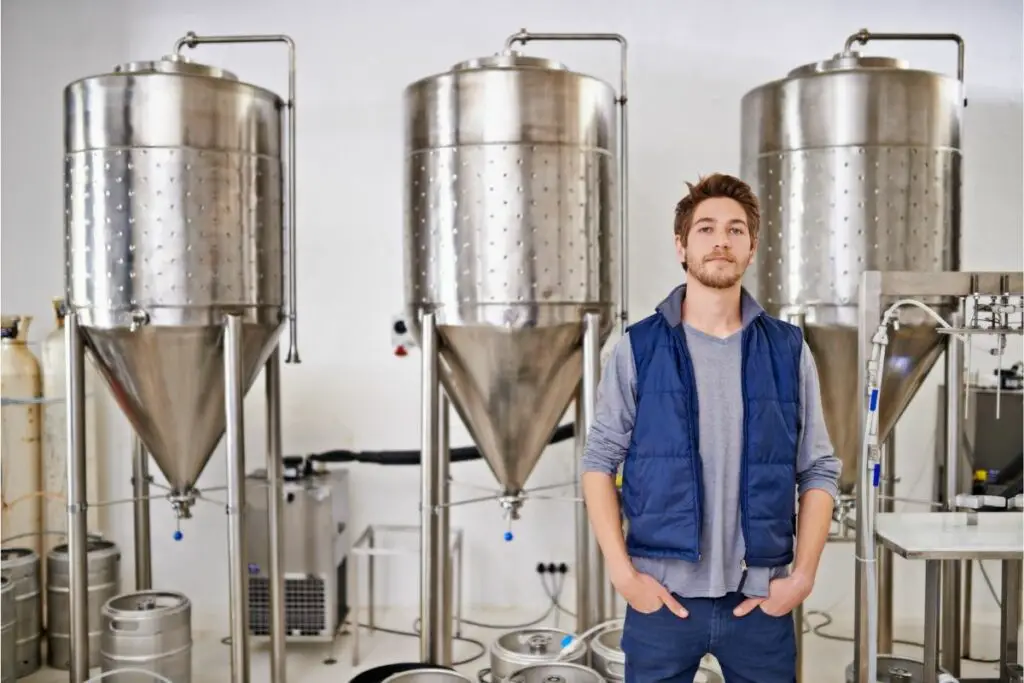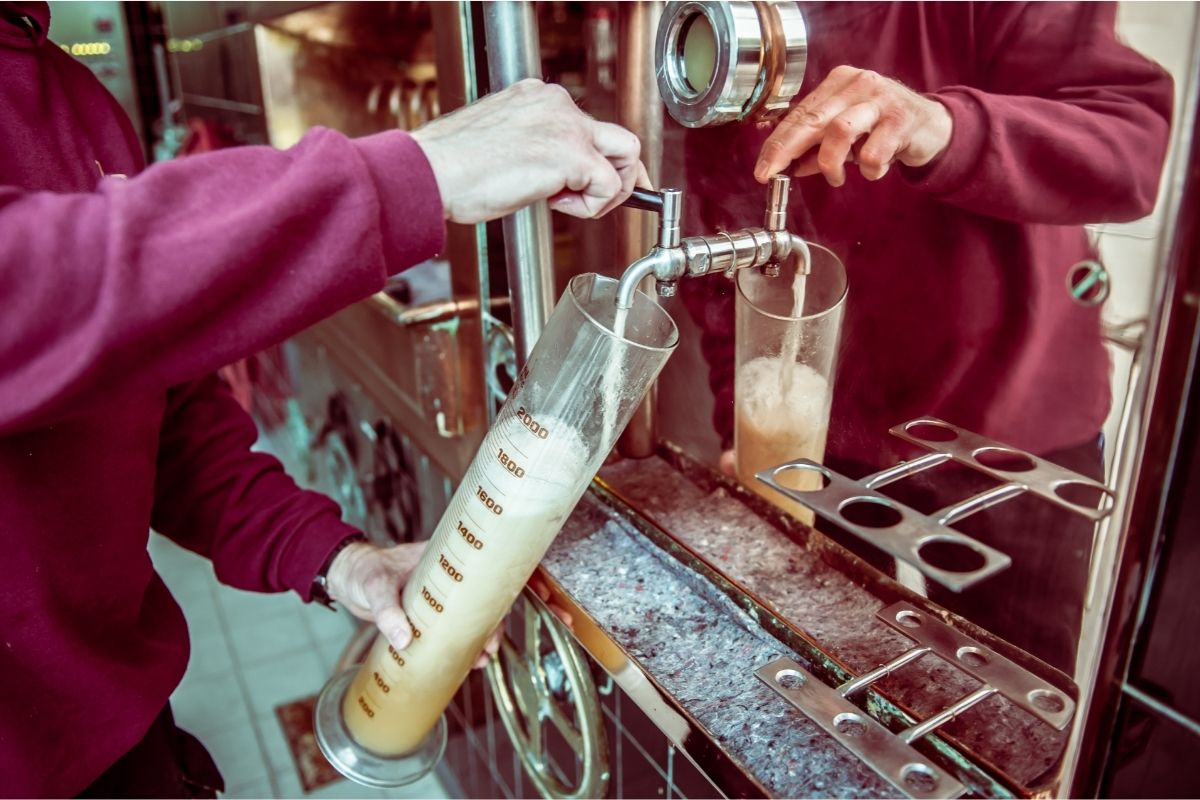
Many occupations exist that provide fulfilling and satisfying employment based on your individual interests and background.
The profession of a brewmaster combines a passion for beers with engineering and science. The function of a brewmaster is discussed in this article, as well as many actions you can take to pursue this career path.
What Is A Brewmaster?
A brewmaster is a person with vast experience and understanding in the development of beers and recipes, as well as alcohol consistency and quality and raw material handling.
They have a comprehensive understanding of several steps involved in brewing beer, including:
- Malting
- Milling
- Mashing
- Boiling
- Fermenting
- Conditioning
- Filtering
They’re usually creative people with a strong math and science background who can create high-quality, unique and fascinating recipes.
What Is The Role Of A Brewmaster?
A brewmaster participates in various stages of the brewing process. They choose the ingredients for their own beer recipes, mix the ingredients, and monitor the fermentation process. A brewmaster’s tasks include:
- Developing and refining original beer recipes
- Choosing high-quality components
- Following strict sanitization methods and guidelines
- Cleaning supplies
- Keeping meticulous records and inventories
- Developing vendor relationships
How Do You Become A Brewmaster?
Brewery-specific educational and job experience requirements can differ. Here are some things you can do to improve your brewing skills and seek a profession as a brewer:
1. Get A Bachelor’s Degree
Brewmasters often have a background in microbiology, brewing, chemistry, food science, engineering, or fermentation science. Brewing beer necessitates a sizable proportion of science and math.
Completing a degree in one of these subjects can provide you with practical experience of pH levels, titrations, CO2 volumes, and concentration calculations, as well as other key aspects of the beer-making process.
2. Take A Brewing Course
Your employer may need you to take brewing classes or obtain a license from an accredited brewing science organisation, depending on your situation.
This stage is also an excellent option for anyone wishing to obtain special knowledge in brewing beer, beer types, brewhouse and cellar operations, and brewery maintenance while learning more about the brewing process.
3. Make Your Own Beer At Home
Beer brewing at home is a great way to get acquainted with the fundamentals of the brewing process on a lesser level.
You can play around with ingredients and yeast strains, aiming to improve the flavour of your beer at each stage of the process.
Taking extensive notes, especially on a creation you’re pleased with, might help you keep track of precise decisions you’ve made.
You may also take online home brewing classes to clarify things. You could even bring a sample of your brew to experienced brewers for input on its flavour and quality.
4. Work At A Brewery As A Volunteer
Voluntary work at a local brewery is a great way to learn about the day-to-day operations of a brewing, such as washing kegs, bottling or canning beers, and engaging with consumers.
Volunteering allows you to ask questions of industry experts who can offer you advice and recommendations as you begin your career. You can use this time to create a community of contacts who can assist you in your career advancement. And who knows… you might be “paid” in pints!
5. Look For An Entry-Level Position At A Brewery
Working entry-level positions at breweries allows you to learn about making beer on the job while working under the guidance of a professional brewer or brewery expert.
Working in a small brewery allows you to supervise the entire beer-making process, from the procurement of raw ingredients to the final product.
Working at a brewery can also provide insight into the beverage industry’s quality or production assurance. Some brewers begin their careers as taproom servers, cellar labourers, laboratory technicians, and assistant brewers.
6. Obtain Certification as a Cicerone
The Cicerone Certification Program allows aspiring brewers to specialise and further enhance their abilities and knowledge.
From Certified Beer Servers to Master Cicerones, the curriculum offers 5 distinct levels of certification. This programme certifies a specific level of expertise in the following five areas:
- Beer storage and service
- Styles of beer
- Beer evaluation and taste
- Ingredients in beer and the brewing process
- Beer and food pairing
These certificates allow you to be recognised for your expertise and tasting abilities, which can help you further your career.
Skills Required Of Brewmasters

Brewmasters possess a combination of hard and soft skills. As a brewmaster, you should have the following skills:
Communication
A brewmaster communicates with a variety of people on a regular basis, including other brewers, staff, production and packing personnel, vendors, and customers.
When explaining your brewery’s demands and allocating responsibilities, it’s critical to communicate clearly.
Customers may frequently interact with you in a number of venues, including the taproom, conferences, contests, festivals, and tastings, where they could ask you to tell them about your brewing company and describe the specifics of your product.
Every brewery’s success depends on its ability to build and maintain connections with consumers and providers.
Knowledge Of Technological Systems And Tools
Technology keeps playing an essential part in the beverage industry’s business operations.
Breweries are increasingly incorporating technology, such as a range of tools and systems, to optimise and simplify the production process.
On your resume, having experience with diverse technologies might make you stand out when looking for employment and make you more desirable to potential employers.
Problem-solving
To balance the combination of biology, chemistry, and technology involved in the process, complicated approaches and a methodical process are required.
When dealing with any of the equipment, such as fermenters, beer tanks, and condition tanks, issues can emerge.
To keep operations on schedule and protect the quality of the products, it’s critical to troubleshoot issues quickly and effectively. Problem-solving skills can also come in handy while tweaking beer formulas.
Creativity
A brewmaster’s job necessitates a certain amount of innovation in several areas. Innovative methods to your product are required while developing premium beer formulas that are distinctive and stick out among competition.
Some brewers, for example, make beers with flavours influenced by seasons or their favourite cuisines, or they mix up unusual flavour combinations.
Growing your business also necessitates a certain amount of imagination, particularly when it comes to marketing your product or company to broaden your reach and create your brand name in the sector.
Conclusion
There are several routes into becoming a successful brewmaster – from earning a college education to learning the role on the job.
Brewmasters have very interesting and creative careers which require a number of hard and soft skills, and a wide knowledge of the beer making process.
- Vevor Still Instructions - June 12, 2023
- Best Proofing Parrots For Home Distilling - February 1, 2023
- What Is A Porter Beer? - June 12, 2022
